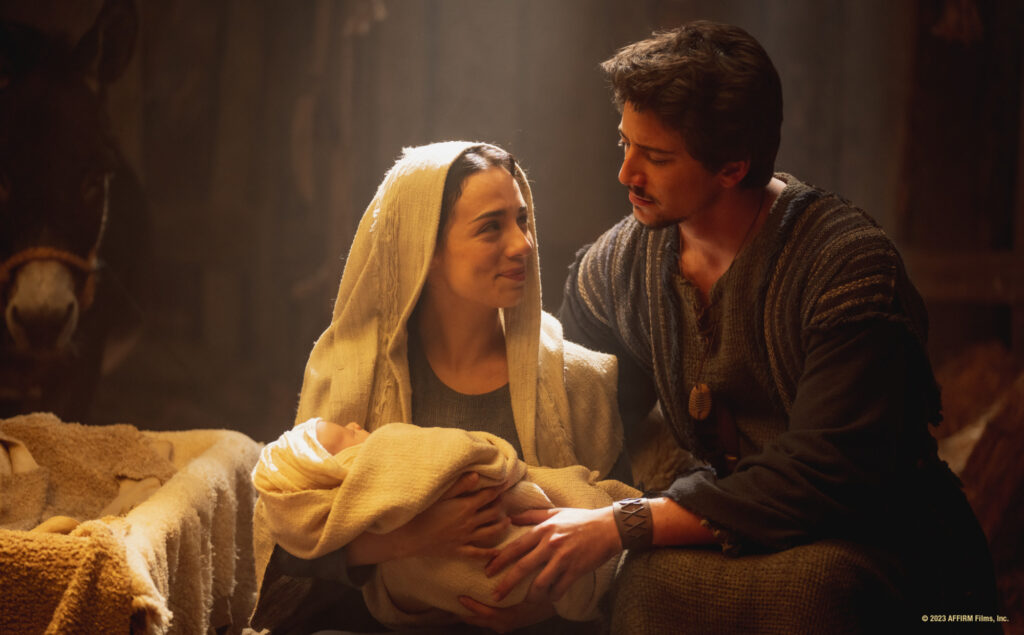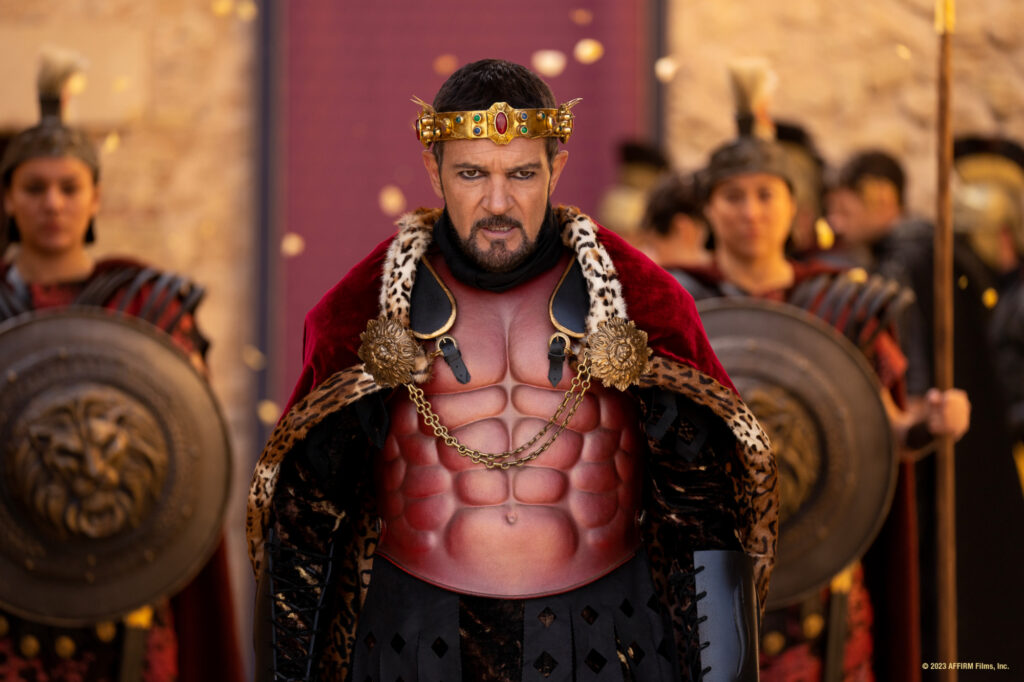January 4, 2024
by Carla Hay

Directed by Adam Anders
Culture Representation: Taking place in the Israeli cities of Nazareth and Bethlehem, the musical “Journey to Bethlehem” (based on New Testament teachings in the Christian Bible) features a racially diverse group of characters (white, Asian, Latino and black) representing the working-class, middle-class and wealthy.
Culture Clash: A virgin named Mary, who is reluctant to marry her fiancé Joseph, is banished from her family after claiming that she is giving birth to the son of God, and the couple goes into hiding from the evil king Herod, who wants to kill the children of Bethlehem.
Culture Audience: “Journey to Bethlehem” will appeal primarily to fans of musicals and faith-based movies that put a contemporary spin on ancient teachings.

As an earnest faith-based musical, “Journey to Bethlehem” does what it’s supposed to do for its intended audience. Other people might be surprised by the charm and appeal of this pop music version of the Bible’s nativity story about Jesus Christ. “Journey to Bethlehem” has some impressive visual effects and production design, considering its relatively low production budget of a reported $6 million. There are also engaging performances from the cast members, even if some of the characters are close to being cariactures.
Directed by Adam Anders (who co-wrote the “Journey to Bethlehem” screenplay with Peter Barsocchini), “Journey to Bethlehem” begins with this voiceover narration: “Long ago, in the time of Caesar Augustus and in the land of Judah, ruled by the evil King Herod, there lived a young woman named Mary, who didn’t know yet that she was chosen by God to fulfill an ancient prophecy to bring forth a promised king sent to save the world.” That king, of course is Jesus Christ.
“Journey to Bethlehem” (which was filmed in Spain) stays faithful to the basics of the biblical story but takes a lot of liberties in the interpretations of the characters. Just like in the Bible, the three kings who knew of the prophecy see the star that signals the arrival of this divine child. In “Journey to Bethlehem,” these three kings are portrayed as a somewhat comedic trio that bickers and banters with each other. It’s not slapstick insult comedy like the Three Stooges. It’s more like the biblical version of Spinal Tap.
Balthazar (played by Geno Segers) is the king with astronomy skills. Caspar (played by Rizwan Manji) is described in the movie as the king who is “the greatest scholar in all the lands.” Melchior (played by Omid Djalili) is the king who’s a great navigator and a map expert. Caspar (who is has a super-serious personality) and Melchior (who has a goofy personality) frequently clash with each other, while easygoing and optimistic Caspar is the most likely one of the three kings to keep the peace when there are conflicts within this lively trio.
Meanwhile, in Bethlehem, Mary (played by Fiona Palomo) is dreading her upcoming arranged marriage because she would rather be a teacher than a wife at this stage in her life. Mary has been betrothed to a man whom she hasn’t met yet. Her father Joachim (played by Antonio Cantos), who is a teacher, tells Mary: “You are a girl. You will be a wife, not a teacher, as tradition demands.” Mary’s mother Ana (played by Maria Pau Pigem) agrees with her husband.
At an open-air market, Mary has a “meet cute” moment with a young adult stranger named Joseph (played by Milo Manheim) when they accidentally bump into each other. He seems to be immediately attracted to her, but she seems to be a little attracted to him too. However, Mary is preoccupied with her worries about the upcoming marriage that she does not want. She’s polite to Joseph but she dismisses his attempts to flirt with her.
Meanwhile, King Herod (played by Antonio Banderas) is fixated on conquering more lands and people. He’s concerned that his eldest son Antipater (played by Joel Smallbone) doesn’t have what it takes to be the type of heir that King Herod wants. King Herod tells Antipater: “A king doesn’t need to be loved—only obeyed and feared.” Antipater, who desperately wants his father’s approval, spends most of the story carrying out Herod’s orders.
When it comes time for Mary to meet her fiancé, the meeting takes place at the home of Mary and her family. The fiancé arrives with his parents. Mary is shocked to find out that her fiancé is Joseph, the same person she met at the market. She’s immediately turned off (and tells Joseph that in a private conversation), because she thinks he shouldn’t have been flirting with her if he knew he was going to marry someone.
Joseph tries to smooth thigs over, but Mary becomes even more resistant to the idea of marrying him. Joseph’s domineering and haughty parents Jacob (played by Antonio Gil) and Rachel (played by Alicia Borrachero) are determined to make this marriage happen, because they want Joseph to inherit what can be offered as part of Mary’s dowry. Mary’s parents also insist that the marriage take place.
Not too long after Mary and Joseph have their first meeting that does not end well, she is visited at night by the angel Gabriel (played by Lecrae), who tells Mary that she will be pregnant and give birth to the son of God while she’s still a virgin. The experience is so profound for Mary, she tells her family members about it. They think she is mentally ill and blasphemous and beg her not to tell Joseph and his family.
However, Mary tells Joseph and his family. And when it becomes obvious that she is pregnant, the wedding is called off, and Mary is exiled to Hebron to live with her middle-aged cousin Elizabeth (played by Yaël Belicha), who is also having a “miracle pregnancy.” Elizabeth and her mute husband Zachariah (played by José María Rueda) welcome Mary into their home and are very protective of her.
King Herod hears about a blasphemous young woman who claims to be pregnant with a child of God. He’s determined to find her to kill her and her unborn child, so he sends Antipater on the hunt to find her. The rest of “Journey to Bethlehem” will not be a surprise to people who already know the story from the Bible.
“Journey to Bethlehem” has very good staging of the musical numbers, which often pop and glow with creative lighting and visual effects. Banderas hams it up as the story’s chief villain in a way that almost verges on parody but has enough self-awareness to hold back and deliver a convincing performance. During King Herod’s solo performance of “Good to Be King,” the set transforms into a menacing replication of the depths of hell to put an emphasis of how evil King Herod is.
Palomo and Manheim give engaging performances as Mary and Joseph. Mary is strong-willed and independent, which is an interpretation that might or might not be to a viewer’s liking. Joseph is portrayed as a forward-thinking person who doesn’t treat women as inferior to men. The blossoming romance between Mary and Joseph is portrayed as sweet and something that doesn’t happen right away because of Mary’s reluctance.
As far the movie’s original songs, “Journey to Bethlehem” has has some that are memorable and others that are on the bland side. Ada Anders, Nikki Anders and Peer Åström wrote the music for “Journey to Bethlehem,” whose musical highlights the anthemic climax of “The Nativity Song.” Antipater’s “In My Blood” brings some psychological “daddy issues” angst to the movie, while the three kings’ song “Three Wise Guys” brings much comic relief.
“Journey to Bethlehem” sometimes comes across as a production with a touring company (not the original cast) of a Broadway show. There’s plenty of musical talent, but it’s not the best of the best. However, “Journey to Bethlehem” is entertaining enough for anyone who wants to see a religious musical that isn’t overly preachy or pretentious and can be enjoyed by people of many generations.
Affirm Films released “Journey to Bethlehem” in U.S. cinemas on November 10, 2023. The movie was released on digital and VOD on December 8, 2023. “Journey to Bethlehem” will be released on Blu-ray and DVD on January 16, 2024.


